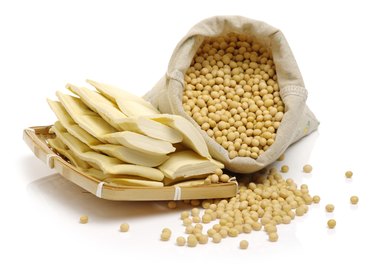
The protein in food is made up of amino acids, and the quality of that protein is based on the number and types of amino acids it contains. Animal foods contain high-quality protein, and egg white has the highest quality protein of all. Unlike other plant or vegetable proteins, soy protein contains all of the essential amino acids necessary for good health. That makes soy protein a complete protein, similar to the protein found in animal foods.
Types
Video of the Day
Of the 20 amino acids your body needs to build proteins required for normal growth and maintenance of health, 9 are called essential amino acids, because they cannot be made by your body and must come from your diet, according to MedlinePlus.com. The 9 essential amino acids, found in soy protein and many animal foods, are histidine, isoleucine, leucine, lysine, methionine, phenylalanine, threonine, tryptophan and valine. Arginine is essential for children but not adults. There are also 10 nonessential amino acids, found in various foods and in different combinations with some or all of the essential amino acids. Your body can make these nonessential amino acids if they are not provided by your diet.
Video of the Day
Function
Soy protein breaks down in your digestive system into amino acids that are absorbed into your bloodstream and travel throughout your body. In the process, some of these amino acids combine with others to form various types of protein that provide structure to your organs and tissues and play roles in various body processes. Some amino acids in soy protein also function as hormones, enzymes and other active substances in the body. As a last resort, your body can also use protein to produce energy when carbohydrates and fats are unavailable.
Sources
The amino acids in soy protein are found in varying amounts and combinations in tofu, soy flour, soy milk, textured soy protein, soy meat substitutes, miso, which is a fermented soybean paste, soybeans and edamame, which are green soy beans.
Limitations
Two essential amino acids in soy protein, methionine and lysine, are present only in small amounts. According to U.S. Department of Agriculture research published in the "Journal of Agricultural and Food Chemistry," this limitation, combined with the number of people who have soy allergies and difficulty digesting soy protein, means that soy protein does not compare as favorably with animal protein for some people as for others.